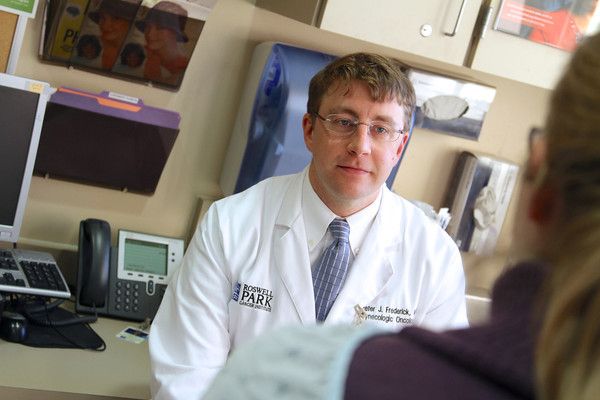You ask the internet a lot of questions and the experts at Roswell Park Comprehensive Cancer Center have some answers. Gynecologic oncologists Katherine LaVigne Mager, MD, and Karen McLean, MD, PhD, sat down to answer some of the internet’s most searched-for questions related to ovarian cancer. Here are their answers to the following questions:
What are the signs of ovarian cancer?
The most common signs of ovarian cancer are actually very non-specific. Symptoms include things like abdominal bloating, a change of bowel habits or bladder habits, a sense of being less hungry than you used to be. Weight loss is not commonly a change with ovarian cancer. The ovarian cancer signs are generally quite non-specific. They can be primarily abdominal symptoms, change in bowel habits or bladder habits, feeling full early or bloated, but really nothing specifically gynecologic.
What causes ovarian cancer?
There are things we know, and there's things we don't know about what causes ovarian cancer. For most women, we don't know the cause at this point. We know that it's frequently associated with a specific genetic mutation, but that mutation is generally not inherited. That being said, there are some genes that can be passed down in families that do put you at higher risk for the development of ovarian cancer. Here at Roswell Park, we have a great genetic testing program where we can schedule you to meet with a counselor and undergo genetic testing if your family history makes us suspicious that one of those inherited conditions may be present.
How to check for ovarian cancer at home
There are a lot of misconceptions about how ovarian cancer can be checked. The challenge is, there are not really great ways to check at home. The very most important thing for women to do is to go to their annual exams and to continue to have what we call a bimanual exam, which means both an internal exam and an external exam to assess for any changes to the pelvic organs.
There’s also a misconception about Pap tests. So many women think that a Pap smear or a Pap test is going to catch if they have ovarian cancer or not, and that's, in fact, not the case.
How is ovarian cancer diagnosed?
Most commonly, ovarian cancer will be diagnosed because someone will present to their doctor with some of the symptoms listed above: changes in bowel habits, feeling like you're bloated, feeling like your appetite isn't the same, pelvic pain, abdominal pain. Your doctor will typically start with just a history and physical, asking about your symptoms, doing a physical exam, and then will usually follow that up with some type of imaging. Usually a transvaginal ultrasound or pelvic ultrasound will be the first step and then, based on that, imaging from there.
What does ovarian cancer leg pain feel like?
This is a little bit of an uncommon part of ovarian cancer. Typically, we don't see women presenting with leg pain. However, sometimes depending on the size of the mass in their abdomen or the other symptoms they have in their abdomen, they can have a situation where they're not bringing fluid back from their legs as well. Leg pain would be pretty nondescript. Swelling would be a more common thing or vague, cramping pain.
One of the things we do worry about with women with ovarian cancer is the risk of blood clots or what's called a DVT, or deep venous thrombosis. The type of leg pain that would be most common would actually be clot-related, and that would tend to be calf pain, cramping feelings and would warrant, whether from ovarian cancer or something else, assessment by a doctor.
Why Roswell Park for ovarian cancer treatment?
Find out what makes Roswell Park unique in treating ovarian cancer.
Learn MoreDoes ovarian cancer affect fertility?
This is a question we hear really commonly, and the short answer is yes, but let me give a little bit more details about that. Ovarian cancer generally is a cancer of women who've gone through menopause. So only about 10% of ovarian cancers are going to occur in women under the age of 40, so in that group where fertility and childbearing is more of a concern. Within that group, the majority of cases are going to be something called a germ cell cancer of the ovary, as opposed to the type of cancer that occurs in older women, called epithelial ovarian cancer.
Regardless of the type, there are frequently fertility-sparing options available, but this is a cancer that arises in one of the reproductive organs. Whether it be confined to the ovary or spread to other organs in the pelvis or other organs in the body, it does have impact on fertility. The degree of that impact is going to depend on the type of ovarian cancer and the extent to which it's spread. This is why it's really important, if you are a young person who's been diagnosed with ovarian cancer, to do a consultation at a center where they are familiar with fertility-sparing approaches and also have programs that can connect you to reproductive endocrinologists or fertility doctors to discuss even further options beyond just the treatment approach.
Is there a screening test for ovarian cancer?
This is such an important question and such a big question that comes up all the time. Unfortunately, there really is no screening test for ovarian cancer. At this point, we do not have a way to recognize ovarian cancer earlier, and we've tried a lot of things: ultrasounds, getting a blood test called the CA 125, getting other types of blood tests on a regular basis to see if we can detect ovarian cancer earlier. Unfortunately, so far, none of these strategies have been successful. It's a really active area of research for everyone in this world, and we're hoping to make some advances in this area. But as of right now, there is no screening test, but just going to your annual physical exam with your gynecologist is the best approach.
Additionally, in women who have strong family histories of cancer, there are things we can do to help with prevention of development of ovarian cancer. If you have a strong family history, it is very, very important to talk to your doctor about that. They may want to consider referral for genetic testing.


